
All rivers in China flow east and Chian-tang is a minor one next to the giants, either in volume or length, but with one exception. Its delta is as large as that of the mighty Yangtze, the third largest river in the world, a few hundred kilometers to the north. Twice a day, as the ocean rises across the entire front of the delta, an enormous amount of water forces its way back up the narrow river upstream, creating one of the most spectacular displays of nature's power--the majestic Chian-tang tide. Not far from the northern bank and near the delta is the beautiful city of Hang-zhou built around the peaceful West Lake surrounded by a ring of rolling hills and with mountains further north.
In early 12th century, the Tartars had conquered northern China. The imperial court of the Song dynasty moved south and settled in Hang-zhou. A construction project was carried out in a city that was already full of historical cites.
One day a man named Xu-xian was walking around the lake on his way home
and as a storm was brooding overhead, he decided to hire a boat and sail
across instead (these boats for hire were like the gondolas in Venice,
but with covers on top to provide shelters from the sun and the rain).
As the boat was set to leave, a beautiful woman, all in white, appeared
and asked if she could share the ride. Xu-xian said yes and she introduced
herself as a Miss Bai-su-zheng.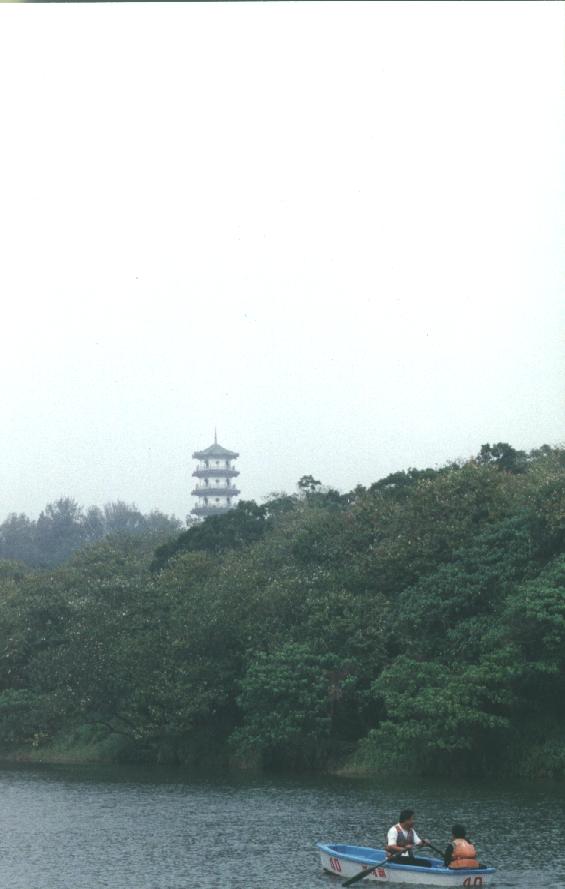 A mist rose as the boat moved slowly across, shrouding the West Lake in
mystery, and the hills and mountains in far distance appeared and disappeared
behind a veil of rising clouds.
A mist rose as the boat moved slowly across, shrouding the West Lake in
mystery, and the hills and mountains in far distance appeared and disappeared
behind a veil of rising clouds.  Their conversation carried on in similar fashion with many smiles and long
stretches of silence in between. Xu-xian thought how beautiful her
smile was.
Their conversation carried on in similar fashion with many smiles and long
stretches of silence in between. Xu-xian thought how beautiful her
smile was.
They both got off the boat near Xu-xian's home, as neither had enough money to send her home. The rain was still pouring, so Xu-xian left her in a tea house nearby, went home and came back with an umbrella. Bai-su-zheng thanked him and left. "Well, that was that", Xu-xian sighed. That night some white figure of celestial beauty appeared in his dream.
 A few days later, Xu-xian heard a woman's voice calling him and it was
Bai-su-zheng again. "I need to return the umbrella, but I forgot to ask
for your address." "Oh, don't worry about that", Xu-xian replied. "That
was very kind of you, but I must return the umbrella", Bai-su-zheng insisted.
"In that case, give me your address and I will come and fetch it." "Alright
then, come to have tea with me. Would the day after tomorrow be convenient
to you? Here is my address. I will see you then."
A few days later, Xu-xian heard a woman's voice calling him and it was
Bai-su-zheng again. "I need to return the umbrella, but I forgot to ask
for your address." "Oh, don't worry about that", Xu-xian replied. "That
was very kind of you, but I must return the umbrella", Bai-su-zheng insisted.
"In that case, give me your address and I will come and fetch it." "Alright
then, come to have tea with me. Would the day after tomorrow be convenient
to you? Here is my address. I will see you then."
 Xu-xian showed up the day after and was served high tea with delightful
desserts, but Bai-su-zheng apologized because it was raining the night
before and her handmaiden made a mistake and took his umbrella instead.
Xu-xian said it was not a big deal any way, but Bai-su-zheng again offered
to bring it back herself. Xu-xian again offered to come for the umbrella
later and was invited to another tea. Xu-xian stayed there the entire
afternoon.
Xu-xian showed up the day after and was served high tea with delightful
desserts, but Bai-su-zheng apologized because it was raining the night
before and her handmaiden made a mistake and took his umbrella instead.
Xu-xian said it was not a big deal any way, but Bai-su-zheng again offered
to bring it back herself. Xu-xian again offered to come for the umbrella
later and was invited to another tea. Xu-xian stayed there the entire
afternoon.
For one reason or another, Xu-xian kept running into her in town and he kept going back for tea. To make a long story short, they were married after about a year, and nobody knew what happened to the umbrella.
 Time passed and one day, Xu-xian was stopped on the street by a Buddhist
monk who introduced himself as Fa-hai, the abbot of the Temple of Gold
Mountain. He invited Xu-xian to have tea with him. Surprised and somewhat
amused, Xu-xian went along with him to a nearby tea house. "I stopped you
because I perceived something unnatural and inhuman around you. Did anything
unusual happen to you recently? Are you acquainted with any new friend?"
"Well, I got married last year to my beloved...." "That's it!", exclaimed
Fa-hai, "She is of animal spirit and not human in her real form." Xu-xian
thought the monk was mad and began to leave. "Wait. You are in mortal danger.
Give me a minute to explain.", Fa-hai forcefully held him back. "This is
what you should do. Tonight, you will take home a large jar of wine and
get her drunk. She will then reveal her true form as she relaxes and falls
asleep in that state." Xu-xian looked at the monk hesitantly. "Look. There
is no harm in this. I will even pay for the alcohol. If she is not as I
said she is, then you will both have a good time and a big laugh at my
expense." Xu-xian reluctantly agreed after a moment of thought.
Time passed and one day, Xu-xian was stopped on the street by a Buddhist
monk who introduced himself as Fa-hai, the abbot of the Temple of Gold
Mountain. He invited Xu-xian to have tea with him. Surprised and somewhat
amused, Xu-xian went along with him to a nearby tea house. "I stopped you
because I perceived something unnatural and inhuman around you. Did anything
unusual happen to you recently? Are you acquainted with any new friend?"
"Well, I got married last year to my beloved...." "That's it!", exclaimed
Fa-hai, "She is of animal spirit and not human in her real form." Xu-xian
thought the monk was mad and began to leave. "Wait. You are in mortal danger.
Give me a minute to explain.", Fa-hai forcefully held him back. "This is
what you should do. Tonight, you will take home a large jar of wine and
get her drunk. She will then reveal her true form as she relaxes and falls
asleep in that state." Xu-xian looked at the monk hesitantly. "Look. There
is no harm in this. I will even pay for the alcohol. If she is not as I
said she is, then you will both have a good time and a big laugh at my
expense." Xu-xian reluctantly agreed after a moment of thought.
Bai-su-zheng was surprised and delighted to see Xu-xian coming home with a huge wine jar. She went to the kitchen and prepared a feast. "My dear husband, I don't know what this is for. But I do know that good wine must be accompanied with good food." Bai-su-zheng never had much wine before and soon she felt dizzy and retired to the bedroom. Xu-xian had a few more cups and then went to the bedroom to see what had happened. As he opened the drapes (the traditional Chinese beds have drapes hung over them to keep the mosquitos out), he saw an enormous white snake about three meters long and he fainted.
He woke up the next morning in his bed and Bai-su-zheng was sitting next to him holding his hand. He instinctively moved away in horror, "Stay away from me, you snake!" "What is the matter with you?", Bai-su-zheng began to cry and became very upset. "I saw a big snake sleeping on the bed last night. The monk was right. You are a snake." Bai-su-zheng looked at him and her expression went gradually from being upset to surprise and finally to relief. "My beloved husband, this is the most absurd thing I have heard in my life", Bai-su-zheng smiled. "You were very drunk and collapsed before you could come to bed and I found you on the floor early this morning. Eat this soup and rest. We will talk about it later."
Xu-xian thought long and hard after his wife left and made up his mind that she was right. Later, when Bai-su-zheng asked about the "monk", he told her his encounter with Fa-hai and she became angry. "How can you listen to a strange monk like that? Half of them in this city are crazy. I love you with all my heart and would die before I let any harm come to you." Xu-xian felt deeply ashamed and with his face red, begged for forgiveness.
A few days later, Xu-xian ran into Fa-hai again. "Well, what happened? What did she turn into?", asked Fa-hai. "Nothing, well, not exactly, but I was drunk..." "No, what you saw was real. What did you see?" "Nothing, and why don't you holiness mind your own business." "You are in mortal danger and I can help you", Fa-hai took out a small dagger from his sleeve, "This is a sacred sword. You don't have to use it, but it will protect you in your time of need. There is no harm in keeping it." Xu-xian ignored Fa-hai whose concern turned into alarm. Looking straight into Xu-xian's eyes and with deep emotion, he said, "What she is doing with you is an abomination in the eyes of gods. I have taken a vow in front of Buddha to guard the innocent and I will not knowingly let you be harmed by an evil spirit. You will come with me to my temple for your protection." Xu-xian struggled to move away, but he was no match against the strength of the monk.
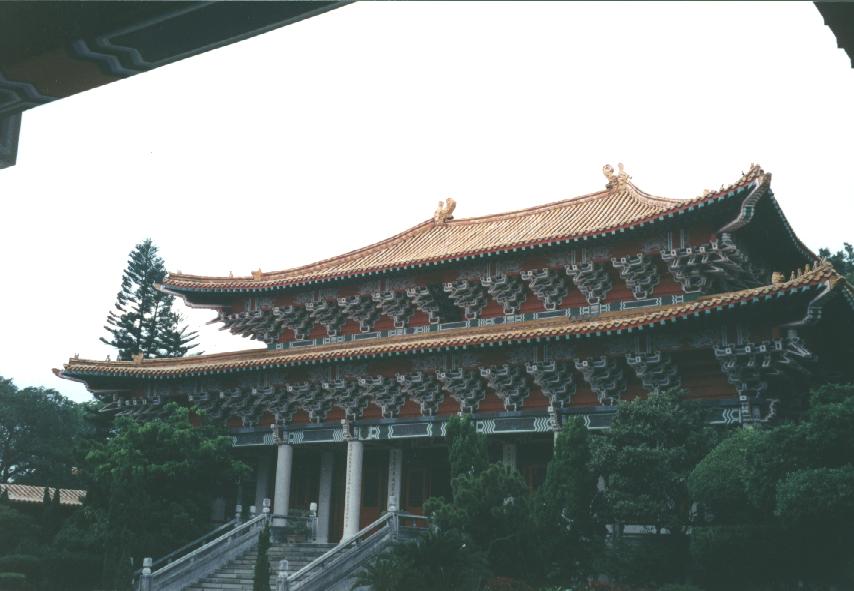
 Bai-su-zheng waited and waited for Xu-xian late into the night and it dawned
on her that something was very wrong. She remembered the conversation about
the "monk" and went to the Temple of Gold Mountain at dawn. Fa-hai came
to meet her. When he saw her, his expression was that of total astonishment.
Bai-su-zheng waited and waited for Xu-xian late into the night and it dawned
on her that something was very wrong. She remembered the conversation about
the "monk" and went to the Temple of Gold Mountain at dawn. Fa-hai came
to meet her. When he saw her, his expression was that of total astonishment.
--"So you are the one who kidnapped my husband."
--"I see you don't recognize me," Fa-hai took off his monk's hat with
a touch of bitterness. Bai-su-zheng was baffled.
--"I guess ten years are a long time and I have shaved my hair to become
a monk". Bai-su-zheng examined him closely and finally sighed, "Why
did you leave without saying good-bye?"
--"I was in love with you", Fa-hai turned to the West lake below him.
--"You could have told me... Actually I felt it then."
--"There was no point."
--"Why?"
--"Because I discovered who you really are and it would have been an
abomination in the eyes of gods."
--"So you changed your name and became a monk."
--"Isn't that what people have always done when they lost but couldn't
forget the love of their lives?"
--"You chose to escape and now you are an abbot."
--"That may have been true ten years ago, but then I discovered a greater
love, the love of Buddha."
--"Xu-xian is the love of my life and you couldn't stand it."
--"I didn't know it was you till a few minutes ago."
--"I see. I am the love of Xu-xian's life and that's what you
could not stand. Now that you know. For our old friendship's
sake, let him go."
--"I have no hatred toward your kind, but what you were doing is an
abomination in the eyes of gods."
--"I shall always be grateful to you for saving my life ten years ago, but
I will use all the power in my possession to get my husband back for I
cannot live without him," Bai-su-zheng raised her right arm, and Fa-hai
asked her to leave.
That same day, the sea began to rise (in Chinese myths, dragons and snakes are spirits of water) and the Chian-tang river commenced its largest tide in history. The entire city was flooded and the water still rose and began its climb up the Gold Mountain. The temple was in a panic, but Fa-hai gathered the monks and reminded them that they were in the temple of Buddha, "Have faith in Him and He will protect us from any harm. Now go to your rooms and pray." He walked out and sat down in front of the gate in the lotus position and began to pray himself. The flood stopped at the foot of the temple, right in front of the spot where he sat.
The flood drowned thousands and left thousands more homeless. Bai-su-zheng must be punished for her deed. The all-knowing and compassionate Buddha in heaven saw all this and was sad. He gave Fa-hai a miniature tower with seven levels, but decreed that Bai-su-zheng's life be spared.
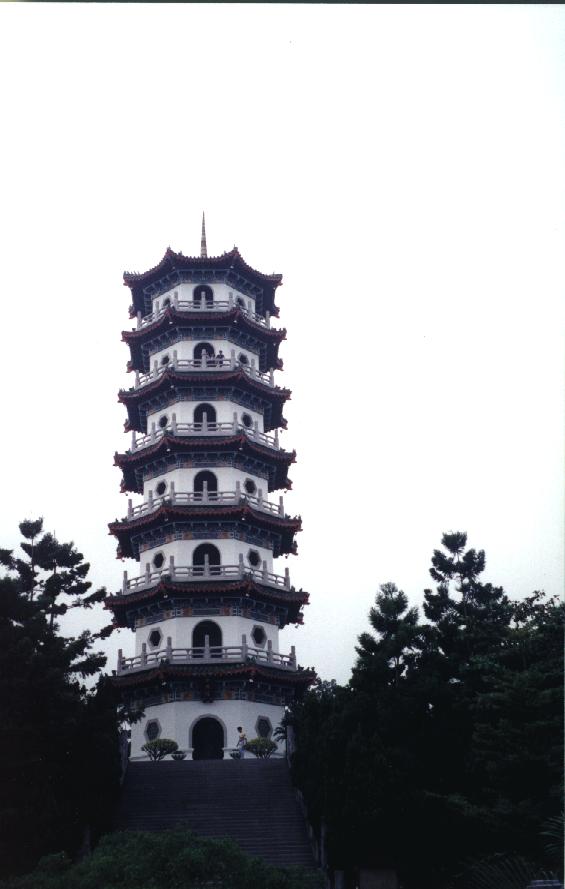 Fa-hai found Bai-su-zheng waiting for him on the Mountain of Thunders. A
battle ensued. Bai-su-zheng summoned all her power, and Fa-hai threw his
tower up high in the sky. The tower grew ten thousand folds in the air
before thundering down over Bai-su-zheng and imprisoned her underneath.
The tower became known as the Tower on the Mountain of Thunders. Fa-hai
left a scroll at the gate, praising the boundless power of Buddha and prophesying
that Bai-su-zheng would be imprisoned as long as the tower stood and warned
the later generations to take proper care of it, so it would stand forever.
Fa-hai found Bai-su-zheng waiting for him on the Mountain of Thunders. A
battle ensued. Bai-su-zheng summoned all her power, and Fa-hai threw his
tower up high in the sky. The tower grew ten thousand folds in the air
before thundering down over Bai-su-zheng and imprisoned her underneath.
The tower became known as the Tower on the Mountain of Thunders. Fa-hai
left a scroll at the gate, praising the boundless power of Buddha and prophesying
that Bai-su-zheng would be imprisoned as long as the tower stood and warned
the later generations to take proper care of it, so it would stand forever.
All myths contain some factual elements. There was a Tower on the Mountain of Thunders constructed in the year 975 in the city of Hang-zhou. I said "was" because after some 900 years, the tower toppled over and collapsed on September 25th, 1924 due to neglect. No one knows what happened to Xu-xian, but Buddhism believes in reincarnation and the all-powerful Buddha is merciful.
* * *
I heard many legends on the knees of my grandma. As I grew older, all of them faded except this "story of Bai-su-zheng". It contains the kernel of a great myth. Like the Arthurian legends, the story of Bai-su-zheng has been told and retold by many poets and some versions went for hundreds of pages. So in the same tradition, I took the liberty to rewrite the story. It is not worthy of the source material. I hope that, some day, some future Chinese Racine will rise to the challenge and turn it into a great poetic drama.
Incidentally, I did some reading in preparation and discovered something very interesting. Historically, the earlier versions portrayed Bai-su-zheng as a trickster and a villain while Fai-hai was the hero who saved Xu-xian from his doom. However, later versions turned the story upside down and Fai-hai became the villain and in many versions was transformed from a toad himself. I don't think Fa-hai should be a toad, but rather a stuck up for law and order, a kind of Creon figure in "Antigone". It should also be a tragedy for him.... It is a pity that Puccini wrote a Turandot instead of a Bai-su-zheng.
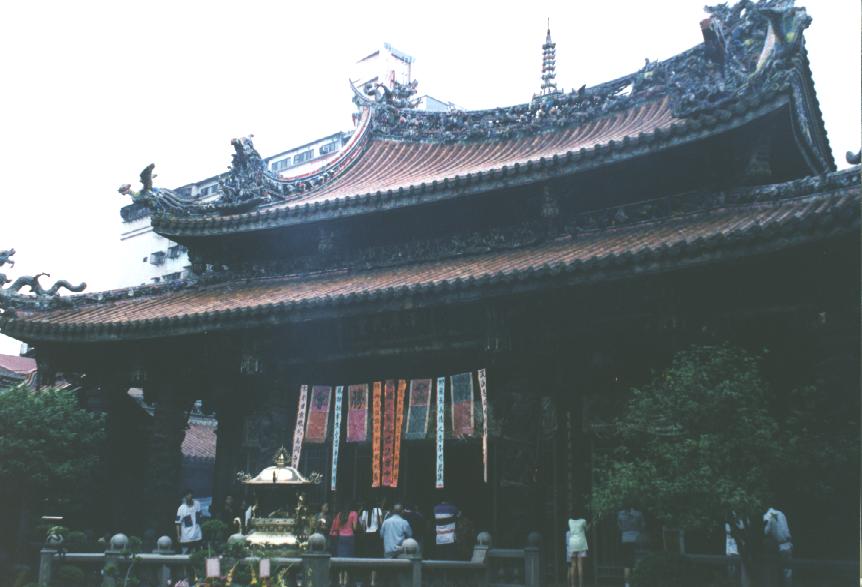 Lung-shan temple is in the old town Taipei and is one of the oldest temples
on the island. When I arrived, the place was littered with junk and
filled with incense smoke that I almost had an allergy attack. A
parade was planned and the place was full of people with loud and tacky
music playing at the main entrance over very loud speakers. The power
supply came from a portable electric generator loaded on a truck and run
by a diesel engine which sounded like a Harley-Davidson without a muffler.
There were two guys playing traditional Chinese horns, slightly out of
tune, in high pitch along with the music from the loudspeakers. You think
the description confusing? It was disorienting. At 6 o'clock sharp, a cop
lit a string of fire crackers and the parade began. The noise from
all this was deafening and just bizarre.
Lung-shan temple is in the old town Taipei and is one of the oldest temples
on the island. When I arrived, the place was littered with junk and
filled with incense smoke that I almost had an allergy attack. A
parade was planned and the place was full of people with loud and tacky
music playing at the main entrance over very loud speakers. The power
supply came from a portable electric generator loaded on a truck and run
by a diesel engine which sounded like a Harley-Davidson without a muffler.
There were two guys playing traditional Chinese horns, slightly out of
tune, in high pitch along with the music from the loudspeakers. You think
the description confusing? It was disorienting. At 6 o'clock sharp, a cop
lit a string of fire crackers and the parade began. The noise from
all this was deafening and just bizarre.
 Chinese are ancestor worshipers. When our loved ones die, they join the
family of gods, similar to the household gods of ancient Rome.
When people worship their parents, they would (or at least should) offer
them their favorite food which is usually left on the alter. This tradition
was incorporated into Taoism when it became a religion and later when Buddhism
went to China. By the way, the alters on that day were filled with junk
food. The temple and its surrounding structures are divided into many small
sections with a miniature statue in each, and each serves a particular
function and grants specific wishes, from finding a mate to passing the
entrance exam of a university to increasing the values of certain stocks.
A special kind of semi-circular disks is provided for those coming for
favors. The worshipers would hold two in their palms and pray and then
throw the semi-disks on the ground. The combination of heads and tails
would tell them whether their wishes would be granted.
Chinese are ancestor worshipers. When our loved ones die, they join the
family of gods, similar to the household gods of ancient Rome.
When people worship their parents, they would (or at least should) offer
them their favorite food which is usually left on the alter. This tradition
was incorporated into Taoism when it became a religion and later when Buddhism
went to China. By the way, the alters on that day were filled with junk
food. The temple and its surrounding structures are divided into many small
sections with a miniature statue in each, and each serves a particular
function and grants specific wishes, from finding a mate to passing the
entrance exam of a university to increasing the values of certain stocks.
A special kind of semi-circular disks is provided for those coming for
favors. The worshipers would hold two in their palms and pray and then
throw the semi-disks on the ground. The combination of heads and tails
would tell them whether their wishes would be granted.
I looked around the place one last time and left, wondering why any god would choose to reside here.
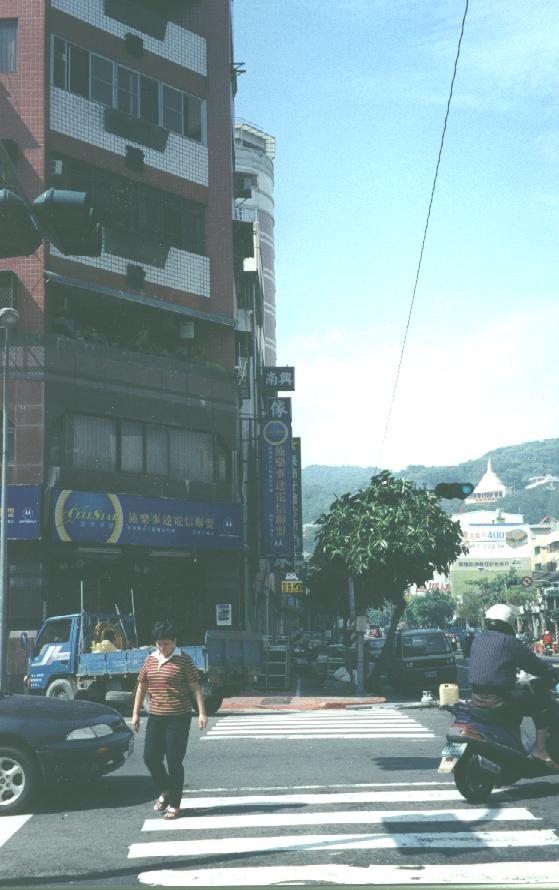
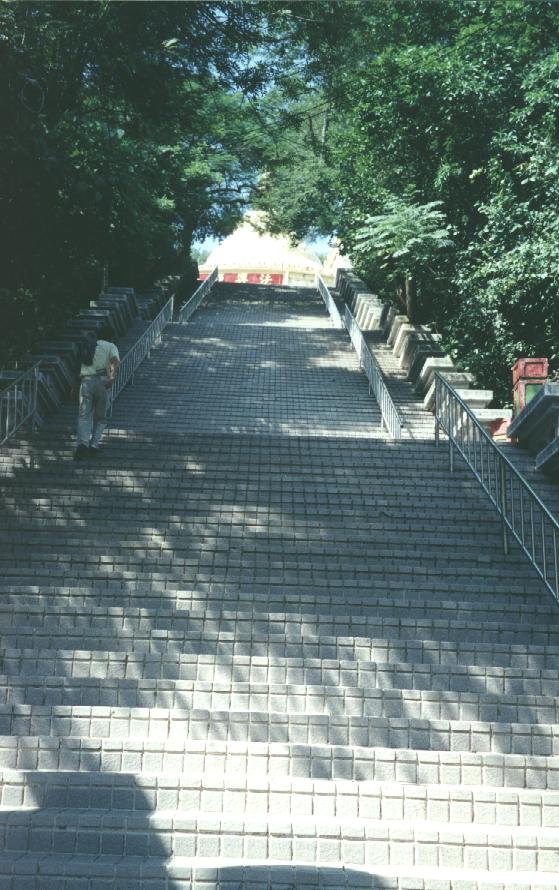 Fa-hua temple is on a small hill at the edge of the city of Gao-xiong at
the southern end of Taiwan. Gao-xiong like other cities on this crowded
island is just another blowup version of the New York City China town.
My cousin whom I hadn't seen for over 15 years told me where my grandmother
lived when she first went to Taiwan in the late 40's. The house no longer
exists and a new purple building stands in its place. From there one could
see in far distance a ridiculously shaped round building which vaguely reminded
me of a building in Beijing. The one in Beijing is of Tibetan origin, and
this one must be a variation. The city abruptly disappeared at the foot
of the hill and a long stairway appeared leading directly to the temple.
The effect was dramatic as I had a feeling of entering a different world.
Fa-hua temple is on a small hill at the edge of the city of Gao-xiong at
the southern end of Taiwan. Gao-xiong like other cities on this crowded
island is just another blowup version of the New York City China town.
My cousin whom I hadn't seen for over 15 years told me where my grandmother
lived when she first went to Taiwan in the late 40's. The house no longer
exists and a new purple building stands in its place. From there one could
see in far distance a ridiculously shaped round building which vaguely reminded
me of a building in Beijing. The one in Beijing is of Tibetan origin, and
this one must be a variation. The city abruptly disappeared at the foot
of the hill and a long stairway appeared leading directly to the temple.
The effect was dramatic as I had a feeling of entering a different world.
The temple is a simple round building with a round hall in the middle and an enormous statue of Buddha in it. One must take off shoes to enter. Near the alter lies a big device that serves as a musical instrument that controls the rhythms during Buddhist chants, a kind of singing that resembles the Gregorian chant. The instrument is called "mu-yue" or "wooden fish". I have always been baffled by its name. Now I see that they are carved in the shape of a (very) abstract fish. The floor was kept spotless and I lied down at the center and took a picture of the ceiling.
The hall is surrounded with a ring of corridor, neatly kept and tastefully decorated. Standing inside the gate and looking out, to the left, there is a beautiful bell with nice calligraphy and a post under it says "Buddha". To the right hangs a red drum and another post below that says "Zen". I took some photos and asked my cousin to be in one of them.
One surprising discovery is that swastikas are common in Buddhist temples. At first, I was shocked and abhorred by its presence. Later I did some research and learned that they are actually ancient symbols for peace. The swastika probably originated in India and there are two versions corresponding to the two orientations. The version that rotates to the right represents good and peace while the one that rotates to the left means evil. There is a further catch to this left and right business. The one that rotates to the right actually has its four legs pointing to the left (think how the swastika would rotate if you put jet engines on its legs). In any case, the Buddhist swastika rotates to the right. Hitler deliberately chose the left rotating one as his Nazi symbol. This "right means good" and "left means evil" seems universal as we can see that the English word for "right" is "right" and in French "to the left" is "a gauche". Now I think about it. This must be only true for the Indo-Europeans. The Taoist symbol seems to rotate to the left!
There are two other buildings nearby. The one next door serves as a dorm
for the monks and is ordinary and non-descript. A short and narrow passage
leads to a small building below. There is nothing impressive about this
building either, being made completely of sheet metal. Above the gate is
a plate that says "the hall of the underworld". Buddhists monks are cremated
when they die and this is where they keep the ash. The gate, made of semi-transparent
material was closed on that day. It was very dark inside, lit only
by a dim red light. With that I could vaguely see a small statue of yet
another Buddha. What was extraordinary was the simple chant that was being
played from a stereo system inside. It consisted of only two notes and repeated
in AABBAB form. It gave an eerie mixed feelings of foreignness
and peace--feelings of being in the land of the dead. Sibelius' "Swan of
Tuonela" came to mind. 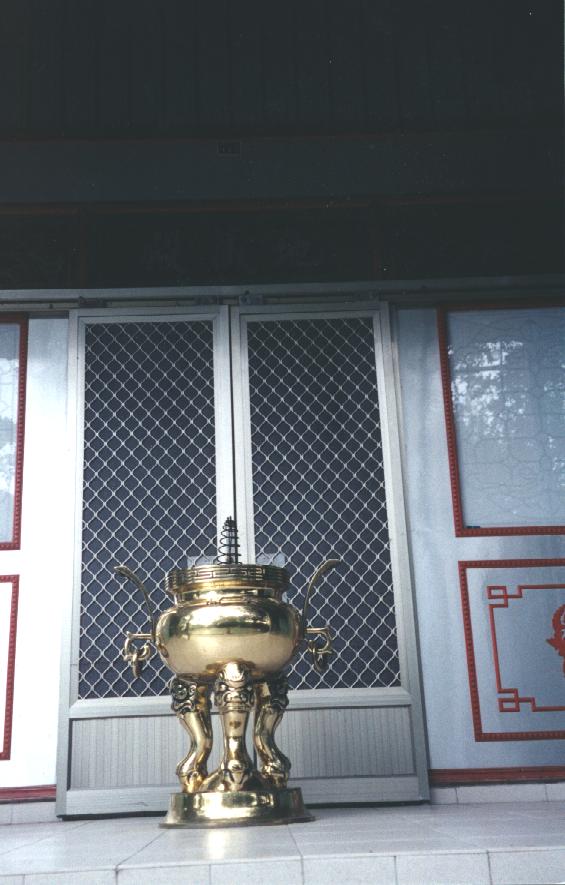 When Avalokitesvara Bodhisattva (known as Guan-yin in China and Taiwan)
was near enlightenment and ready to leave, all beings in the world wailed
in anticipation of his departure. Seeing this, he gave up the ultimate
release and took a vow to stay and help. A less known story tells
the one who was also about to achieve release, but vowed to go to the underworld
and wouldn't leave till everyone else has. This seems to me ten orders
of magnitude more difficult and greater than what Avalokitesvara Bodhisattva
did. I don't know the Indian name of this guy and it may not have existed
in the original Buddhism when it went to China. To the Chinese, he is simply
known as the "Buddha of the underworld."
When Avalokitesvara Bodhisattva (known as Guan-yin in China and Taiwan)
was near enlightenment and ready to leave, all beings in the world wailed
in anticipation of his departure. Seeing this, he gave up the ultimate
release and took a vow to stay and help. A less known story tells
the one who was also about to achieve release, but vowed to go to the underworld
and wouldn't leave till everyone else has. This seems to me ten orders
of magnitude more difficult and greater than what Avalokitesvara Bodhisattva
did. I don't know the Indian name of this guy and it may not have existed
in the original Buddhism when it went to China. To the Chinese, he is simply
known as the "Buddha of the underworld."
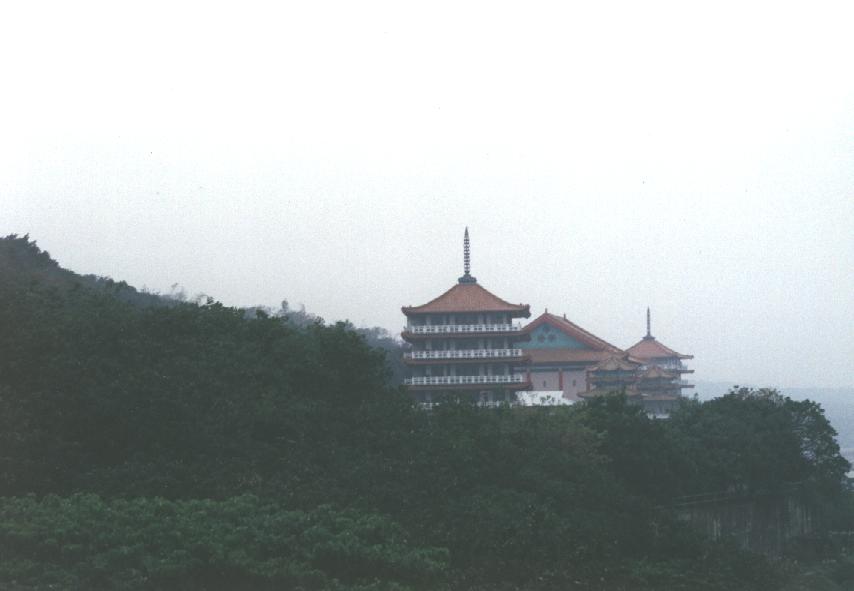 Yuan-heng temple is about a mile from Fa-hua monastery. The temple
reminded me of a Catholic cathedral, but is rectangular instead of being
a cross. My cousin and I arrived around 3:30 in the afternoon and some
sort of service was to begin. The hall was crowded by about five hundred
people in black or dark brown robes, with over 90% of them women. I was
in shorts, sneakers and with a backpack and a camera on my back. I hesitated,
but my cousin said that it didn't matter, so we took off our shoes
and went in. There was no seat in the temple, but everyone was provided
with a pillow. People sat on them and were socializing. I felt a bit conspicuous
and sat in the very last role. Facing the people were three enormous and
identical statues of Buddha sitting on lotuses in identical meditative
positions.
Yuan-heng temple is about a mile from Fa-hua monastery. The temple
reminded me of a Catholic cathedral, but is rectangular instead of being
a cross. My cousin and I arrived around 3:30 in the afternoon and some
sort of service was to begin. The hall was crowded by about five hundred
people in black or dark brown robes, with over 90% of them women. I was
in shorts, sneakers and with a backpack and a camera on my back. I hesitated,
but my cousin said that it didn't matter, so we took off our shoes
and went in. There was no seat in the temple, but everyone was provided
with a pillow. People sat on them and were socializing. I felt a bit conspicuous
and sat in the very last role. Facing the people were three enormous and
identical statues of Buddha sitting on lotuses in identical meditative
positions.
Four o'clock, a bell rang gently and everyone stood up and began to sing "Om" continuously to a tune that loops back to itself. It went on for about 3 minutes and another bell rang and half of the people in the hall kneeled down on their pillows simultaneously. It was a most impressive sight. While everyone was still singing just as before, the tone changed subtly, due to the change in acoustic. Another ringing of the bell, everyone stood up again. Another, the other half kneeled down.
I looked at the three statues carefully and noticed that they were not identical after all. The middle one had his two hands facing up, one on top of the other, leveled at his navel. The left statue had his right hand slightly extended forward toward the people while the right Buddha had his left fore-arm lifted at a 45 degree to make an "OK" sign, but with his thumb touching his ring finger instead of his index finger. To me, it seemed that the middle was at peace and being still, while the other two suggested some kind of action. Looking up, there was a sign above each and the one in the middle said, "The solemn stillness of Buddha" while the other two respectively said, "The light of Buddha is everywhere" and "Spread the Word to save the world". As the chant went on, it occurred to me that this could be a parallel representation of the concept of Trinity in Christianity--They were the same Buddha; yet the one sitting in absolute stillness was the Father; the one that descended as the light of Buddha was the Holy Spirit and the one to spread the Word was the Son.
The hall was supported by four great columns and each was decorated with myriads of small doors with a light above each. There is a saying that the gates to Buddha are wide and many and everywhere. I remembered a story that during a conference on world religion (must have been sponsored by the Pope) Dalai Lama said that all our ways are valid ways and our ends are the same. Immediately, a Catholic priest stood up and said, "No, we are different".
The chant went on for fifty minutes and then the bell pealed loudly and the cycle went on for two more rounds and stopped. The lights came on and a service (very much like a Catholic one) followed.

 The outside walls of the temple are decorated with twenty-two bronze plates
retelling the story of Buddha. Buddha and Christ are both representatives
of the universal hero archetype (and more) and this is reflected in their respective
stories. Buddha was in heaven and saw all the suffering and misery
in the world, so he decided to become human in order to save them. A queen
dreamed of a white elephant informing her that a savior would come to the
world through her. When Buddha was born, a wise man came to proclaim the
sacred birth. Buddha grew up and saw sickness, old age and death and decided
to leave his palace to find salvation. He went to the forest to meditate
and found no release, so he wandered all over India. After six years
and still without peace, he went back to the forest. He tried fasting
and became so weak that when he went to take a bath in the nearby river,
he didn't even have the strength to stand up. A shepherd girl was
passing by and fed him her milk. His disciples saw this and left
him. Buddha went back to his tree and as he came near enlightenment,
devils showed up in the thousands to seduce and attack him. He defeated
them all and his soul held firm and still. On the brilliant starry
night of December 8, 513 B.C., he at last broke through and achieved enlightenment,
hence, full release from all the misery and suffering that is of this world.
The earth mother joyfully proclaimed her beloved Son. By saving himself,
He pointed the Way for all, thus saving the world.
The outside walls of the temple are decorated with twenty-two bronze plates
retelling the story of Buddha. Buddha and Christ are both representatives
of the universal hero archetype (and more) and this is reflected in their respective
stories. Buddha was in heaven and saw all the suffering and misery
in the world, so he decided to become human in order to save them. A queen
dreamed of a white elephant informing her that a savior would come to the
world through her. When Buddha was born, a wise man came to proclaim the
sacred birth. Buddha grew up and saw sickness, old age and death and decided
to leave his palace to find salvation. He went to the forest to meditate
and found no release, so he wandered all over India. After six years
and still without peace, he went back to the forest. He tried fasting
and became so weak that when he went to take a bath in the nearby river,
he didn't even have the strength to stand up. A shepherd girl was
passing by and fed him her milk. His disciples saw this and left
him. Buddha went back to his tree and as he came near enlightenment,
devils showed up in the thousands to seduce and attack him. He defeated
them all and his soul held firm and still. On the brilliant starry
night of December 8, 513 B.C., he at last broke through and achieved enlightenment,
hence, full release from all the misery and suffering that is of this world.
The earth mother joyfully proclaimed her beloved Son. By saving himself,
He pointed the Way for all, thus saving the world.
Hoechsten Heiles Wunder!
Erloesung dem Erloeser!
And I saw a dove appeared.